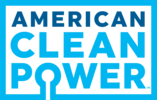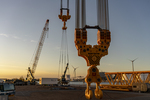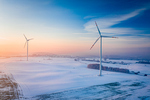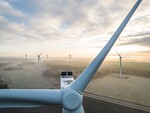News Release from American Clean Power Association (ACP)
Wind Industry Profile of
11/21/2010
USA - Wind turbines transportation: communication is key
Another area where the trend toward larger wind turbines and components is driving the need for communications is rail transportation.
You might not think it, but panelists in the Transportation and Logistics session at AWEA’s Fall Symposium yesterday generally said that communication is the key to success in transporting larger and larger wind turbine components.
Why?:
One major factor is shorter project lead time. As Gary Kowaleski, Logistics Director for Suzlon Wind Energy, pointed out, a few years ago it was common in the industry for wind turbine manufacturers to sign large-scale frame agreements, in which a major wind farm developer would agree to buy hundreds of wind turbines over a period of years.
In that environment, wind turbine components might be manufactured in large numbers and transported to a storage location. With reduced demand and the transformation of the industry to a buyer’s market, developers are buying wind turbines more on an individual wind power project basis, and manufacturers are seeking to deliver them “just in time.”
This change means shorter advance time for delivery of components, compressed schedules, and increased emphasis on actively communicating with state transportation agencies to obtain permits for the very large, heavy truckloads the wind energy industry requires.
Ryan Reed, a transportation and logistics planner for Siemens Wind Power, concurred. “Carriers have problems getting permits in time, regulatory issues with departments of transportation, and then issues with local communities. We try to get to communities well in advance so we can discuss potential problems with them and work them out.”
Reed also said pressure on state budgets has added a new dimension to the problem. A police escort is required for heavy trailers in California, he said, and recently the escort for a planned shipment did not show up due to a ban on police overtime: “We went to the Department of Transportation and explained that we were paying for the overtime, and got it worked out, but … “
Another area where the trend toward larger wind turbines and components is driving the need for communications is rail transportation. Railroads have a huge advantage, noted Union Pacific Director Ken Adams—“Union Pacific operates in 23 states, and we don’t need permits.”
At the same time, though, railroads can only transport products up to a certain size. Using rail for parts that are larger than 14 feet, 2 inches in height is very problematic. As a result, Adams said, the railroad is communicating with turbine designers to encourage them to find ways to keep their components within a size range that allows transportation.
Other quick takeaways from the session:
- The shorter project lead time has made it less likely that barges will be used for transportation. Said Reed, “Siemens hasn’t used barges. One challenge is that typically barge transport taks a lot of time, and we are aiming at just-in-time, so it doesn’t lend itself effectively, though we’re still looking at it.”
- Transportation costs can vary dramatically depending on the project’s location and the route required for components to reach their destination.
- Blade lengths are continuing to increase, with some now in excess of 50 meters beginning to enter the market.
- The St. Lawrence Seaway has been “massively underutilized for the past 15-20 years,” according to Tim Downey of the Seaway’s Office of Trade Development & Public Affairs. Added Downey, “We have literally 50% of capacity ready to go, so please check us out,” as routes using the Seaway that may not be intuitive may still turn out to be competitive.
- The federal Department of Transportation’s new CSA-2010 (Comprehensive Safety Analysis) program, which will be fully implemented during the coming year, looms as a potential issue for transportation companies, according to Jay Follandori, Vice President, Heavy Specialized for Landstar Transportation Logistics. While the program is aimed at improving safety, a critical goal, “the prediction is that five to 10 percent of motoring capability will disappear,” Follandori said: “Some drivers will be eliminated, and there will be a shortage in the industry.”
For more information on this article or if you would like to know more about what www.windfair.net can offer, please do not hesitate to contact Trevor Sievert at ts@windfair.net.
www.windfair.net is the largest international B2B Internet platform – ultimately designed for connecting wind energy enthusiasts and companies across the globe!
You might not think it, but panelists in the Transportation and Logistics session at AWEA’s Fall Symposium yesterday generally said that communication is the key to success in transporting larger and larger wind turbine components.
Why?:
One major factor is shorter project lead time. As Gary Kowaleski, Logistics Director for Suzlon Wind Energy, pointed out, a few years ago it was common in the industry for wind turbine manufacturers to sign large-scale frame agreements, in which a major wind farm developer would agree to buy hundreds of wind turbines over a period of years.
In that environment, wind turbine components might be manufactured in large numbers and transported to a storage location. With reduced demand and the transformation of the industry to a buyer’s market, developers are buying wind turbines more on an individual wind power project basis, and manufacturers are seeking to deliver them “just in time.”
This change means shorter advance time for delivery of components, compressed schedules, and increased emphasis on actively communicating with state transportation agencies to obtain permits for the very large, heavy truckloads the wind energy industry requires.
Ryan Reed, a transportation and logistics planner for Siemens Wind Power, concurred. “Carriers have problems getting permits in time, regulatory issues with departments of transportation, and then issues with local communities. We try to get to communities well in advance so we can discuss potential problems with them and work them out.”
Reed also said pressure on state budgets has added a new dimension to the problem. A police escort is required for heavy trailers in California, he said, and recently the escort for a planned shipment did not show up due to a ban on police overtime: “We went to the Department of Transportation and explained that we were paying for the overtime, and got it worked out, but … “
Another area where the trend toward larger wind turbines and components is driving the need for communications is rail transportation. Railroads have a huge advantage, noted Union Pacific Director Ken Adams—“Union Pacific operates in 23 states, and we don’t need permits.”
At the same time, though, railroads can only transport products up to a certain size. Using rail for parts that are larger than 14 feet, 2 inches in height is very problematic. As a result, Adams said, the railroad is communicating with turbine designers to encourage them to find ways to keep their components within a size range that allows transportation.
Other quick takeaways from the session:
- The shorter project lead time has made it less likely that barges will be used for transportation. Said Reed, “Siemens hasn’t used barges. One challenge is that typically barge transport taks a lot of time, and we are aiming at just-in-time, so it doesn’t lend itself effectively, though we’re still looking at it.”
- Transportation costs can vary dramatically depending on the project’s location and the route required for components to reach their destination.
- Blade lengths are continuing to increase, with some now in excess of 50 meters beginning to enter the market.
- The St. Lawrence Seaway has been “massively underutilized for the past 15-20 years,” according to Tim Downey of the Seaway’s Office of Trade Development & Public Affairs. Added Downey, “We have literally 50% of capacity ready to go, so please check us out,” as routes using the Seaway that may not be intuitive may still turn out to be competitive.
- The federal Department of Transportation’s new CSA-2010 (Comprehensive Safety Analysis) program, which will be fully implemented during the coming year, looms as a potential issue for transportation companies, according to Jay Follandori, Vice President, Heavy Specialized for Landstar Transportation Logistics. While the program is aimed at improving safety, a critical goal, “the prediction is that five to 10 percent of motoring capability will disappear,” Follandori said: “Some drivers will be eliminated, and there will be a shortage in the industry.”
For more information on this article or if you would like to know more about what www.windfair.net can offer, please do not hesitate to contact Trevor Sievert at ts@windfair.net.
www.windfair.net is the largest international B2B Internet platform – ultimately designed for connecting wind energy enthusiasts and companies across the globe!
- Source:
- By Tom Gray, www.aweablog.org / American Wind Energy Association
- Author:
- Posted by Trevor Sievert, Online Editorial Journalist
- Email:
- windmail@awea.org
- Link:
- www.awea.org/...
- Keywords:
- AWEA; wind energy, wind power, wind turbine, onshore, offshore, windmill, www.windfair.net, Trevor Sievert, ECA



























